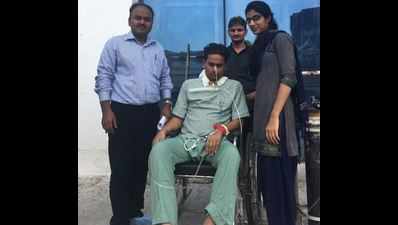- News
- City News
- lucknow News
- RML Institute introduces ECMO, technique that saves ‘gone cases’
Trending
This story is from October 8, 2016
RML Institute introduces ECMO, technique that saves ‘gone cases’
There's hope for patients whose breathing mechanism fails due to infection or injury and doesn't revive even with ventilator support.

There's hope for patients whose breathing mechanism fails due to infection or injury and doesn't revive even with ventilator support.
LUCKNOW: There's hope for patients whose breathing mechanism fails due to infection or injury and doesn't revive even with ventilator support.
City based Ram Manohar Lohia Institute of Medical Sciences can now extend the ECMO (or Extracorporeal membrane oxygenation) technique. The first beneficiary of the effort was declared out of danger by institute's health team here on Friday.
Talking to TOI, team leader Dr PK Das explained that problem arises because of the failure of lung function (due to medical condition called Acute Respiratory Distress Syndrome) which inhales oxygen and exhale carbondioxide generated inside the body.ARDS may occur due to infection, injury or inhalation of toxic substances.
"Such patients are put on ventilator support for survival. But there may be some in whom ventilator doesn't work making death certain. ECMO can save 30-40% of such medically gone cases," he said adding, "ECMO, he added, works by removing blood from the person's body and artificially removing the carbon dioxide while providing oxygen to the patient externally."
Director, RMLIMS and head of anaesthesiology department, Dr Deepak Malviya said, "we are the first center in UP to be providing the facility. It is also available in centers like Medanta Medicity, Sir Ganga Ram Hospital and Riddhi Siddhi Hospital. Though costly even in the government sector, the method is life saving and at least 40% cheaper than private hospitals."
A random market survey revealed that the process costs anything between Rs 20 -30 lakhs in the private hospitals. "Patients spend about Rs 2-3 lakh on consumables to begin with while they have to pay an estimated Rs 50,000 per day thereafter for the subsequent days," an official shared.
City based Ram Manohar Lohia Institute of Medical Sciences can now extend the ECMO (or Extracorporeal membrane oxygenation) technique. The first beneficiary of the effort was declared out of danger by institute's health team here on Friday.
Talking to TOI, team leader Dr PK Das explained that problem arises because of the failure of lung function (due to medical condition called Acute Respiratory Distress Syndrome) which inhales oxygen and exhale carbondioxide generated inside the body.ARDS may occur due to infection, injury or inhalation of toxic substances.
"Such patients are put on ventilator support for survival. But there may be some in whom ventilator doesn't work making death certain. ECMO can save 30-40% of such medically gone cases," he said adding, "ECMO, he added, works by removing blood from the person's body and artificially removing the carbon dioxide while providing oxygen to the patient externally."
About the patient he said, "the beneficiary was a 23-year-old youth who developed ARDS in his hometown Allahabad. He kept shuttling to different places including Sanjay Gandhi Post Graduate Institute of Medical Sciences before reaching us on September 12. Showing no improvement, the youth was almost sure to die when the family was offered ECMO on September 22. The system worked and he bounced back to life."
Director, RMLIMS and head of anaesthesiology department, Dr Deepak Malviya said, "we are the first center in UP to be providing the facility. It is also available in centers like Medanta Medicity, Sir Ganga Ram Hospital and Riddhi Siddhi Hospital. Though costly even in the government sector, the method is life saving and at least 40% cheaper than private hospitals."
A random market survey revealed that the process costs anything between Rs 20 -30 lakhs in the private hospitals. "Patients spend about Rs 2-3 lakh on consumables to begin with while they have to pay an estimated Rs 50,000 per day thereafter for the subsequent days," an official shared.
End of Article
FOLLOW US ON SOCIAL MEDIA











